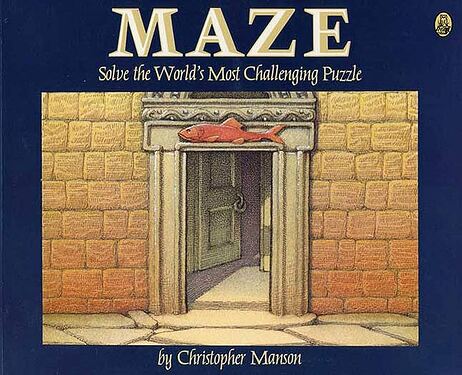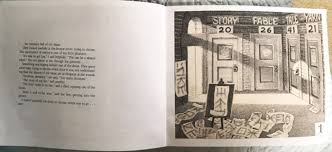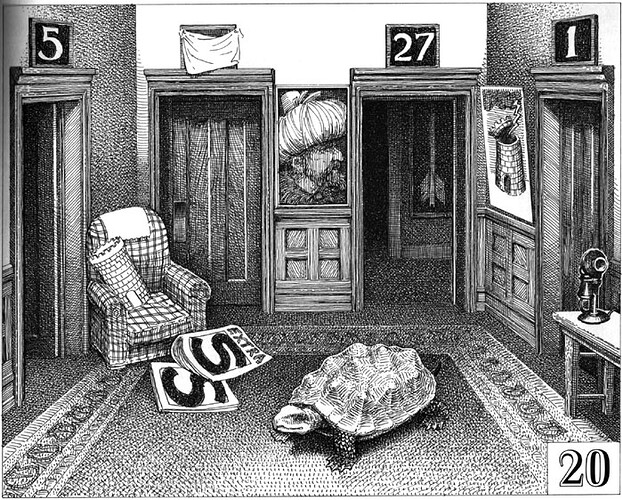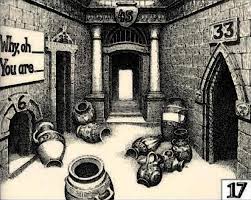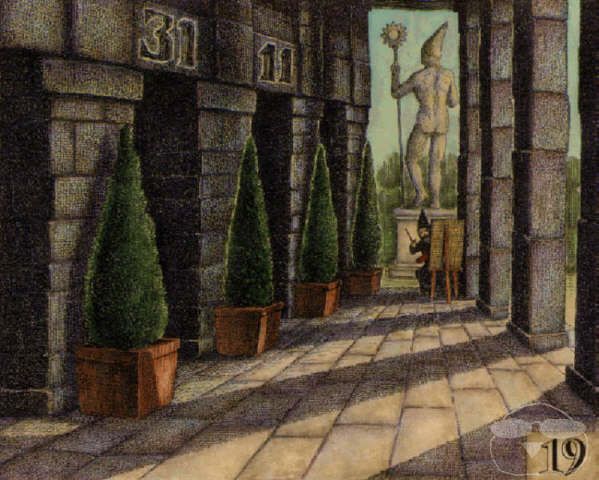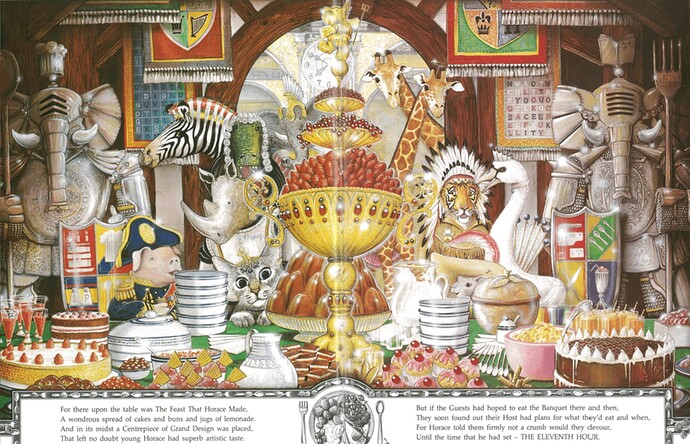Many years ago I became fascinated by logic puzzles after looking at the book recommendations in the back of a programming book called “The Little Schemer.” Now that I’m getting into writing text-based IF I’m finding a lot of inspiration in these books (especially the ones by Raymond Smullyan), but I’d love to know of any of your favorite puzzle books!
Land of Lisp by Conrad Barski, MD
There is another similar but it slips my mind.
Land of Lisp is a cool programming book, even if it isn’t a puzzle book. I only really mentioned Little Schemer cause of the bibliography at the back ^^
I remember liking Martin Gardner’s A-Ha! books a lot.
There were also books featuring a fellow called Uncle Bungle. I don’t remember the name. Apparently he was a character in a Sunday Times column and the book was a collection of those puzzles. Well, according to Google. “Puzzles for Pleasure” by E R Emmet might be it, but I don’t know.
I myself was too dumb to solve this, but I loved the surreal pictures and wandering around paperback CYOA style.
I’ve got a bookshelf full of books on board games, puzzles and mathematical recreations, yet none of them jump out as inspiration. If pressed, I’d have to say the classics by Henry Dudeney and Sam Lloyd are hard to beat, because of the variety, and I enjoy the analysis of puzzles in Martin Gardener’s books, which are collections of his Scientific American columns.
I also enjoy mechanical puzzles, so a couple of hard-cover books on sliding block puzzles and peg solitaire are favourites.
I guess I only knew Maze by reputation up to now. (The MIT Mystery Hunt puzzle it inspired is an all-time great, and I recognized this without recognizing the source material.) This intotheabyss.net site is incredibly fascinating, and I strongly suspect that delving through the comments and related sites to piece together the history of Maze scholarship has been roughly as enthralling and gratifying for me as poring over the book itself would have been.
Because, as far as I can tell, although I guess this is a spoiler,
the puzzles of Maze would seem to be incredibly terrible, by local/contemporary standards, the standards that say puzzles should be unambiguous and solvable and fun. Examples outlined in this post make it clear that the confirmed solutions and intended interpretations are a load of hot nonsense, and one must conclude that if the book has any more secrets to give up, they are obfuscated by the same sort of inscrutable, unguessable, under-beta-tested dream logic.
And this is a smart move, when your book-puzzle has a huge cash prize that you would prefer to award only after a period of years, if at all. But this also seems to be necessary for Maze to have the haunted legacy and devoted following and decades of analysis that it has. If it were completely solvable, people would have completely solved it, and it would be over; nobody would care. Look at Fez: It’s a fantastic game, and everyone played it and loved it and figured it all out, so nobody has anything to say about it anymore—except for the unsolved, unsolvable monolith puzzle.
I have noticed in the depths of intotheabyss that certain solutions or interpretations are credited to @zarf and @baf . I would love to hear what either of them have to say about the tortuous history of Maze.
My favorite puzzle book is The Eleventh Hour: A Curious Mystery, by Graeme Base. It had the same grip on me as a kid that every Maze fan says Maze had on them. I didn’t solve it myself; in my school library’s copy, the seal was already broken on the packet of solutions in the back. But I feel confident saying that the puzzles in The Eleventh Hour are fair, solvable, and brilliant. It lets you confirm your solution without having to open that packet! Anyone who cares about puzzles can learn a lot from this book—probably a lot more than they can learn from Maze.
Yet I think it’s telling that you don’t hear much about The Eleventh Hour these days. People don’t write thinkpieces about what an apt metaphor it is for our 21st-century sense of alienation. Nobody in the Maze fandom brings up The Eleventh Hour as a point of comparison. It was solvable; it was solved, so it is over. Well, they are missing out. And they aren’t missing out on a labyrinth of crosshatched gloom and doom—they are missing out on a FEAST OF BREATHTAKING DELIGHTS.
I remember that the Graeme Base books were always heavily featured/promoted in bookshops. I recognise a lot of the titles and seem to recall my niece being obsessed with one of them, perhaps Animalia. I just looked up his web site and noticed a lot of Australian animals and Australian themes featured in his books. A bit more checking and…bugger me if he ain’t an Aussie!
My only contribution to that site is that I saved the “hint” and “solution” slips that the publisher sent out for the Maze contest. (Photos here.)
@jmac wrote a blog post long ago on the subject titled “Maze: beautiful, inspirational, unsolvable | The Gameshelf” which about sums up my feelings.
There’s one further problem with studying Maze today, which is that the IntoTheAbyss site is, I’m pretty sure, a farago of overreading. They’ve caught up every clue that the author intended, plus every red herring, plus every detail that the author just put in because he was drawing stuff; they’ve decided that every piece is part of a puzzle; and then they solved them all. This makes it hard to distinguish bad puzzles from hallucinated puzzles.
Chris Manson also wrote The Practical Alchemist, a puzzle which is more constrained but still not very solvable. At least, I spent a lot of time on it and never got close.
Daedalian Depths (Rami Hansenne) is a contemporary homage to Maze which is entirely solvable.
Masquerade (Kit Williams) is the first famous puzzle contest book, but his Bee Book (you have to figure out the real title) is a much more approachable puzzle. As you say, not running an expensive contest gives the author much more freedom to make the puzzle fun.
There was a recent (well, 2010) puzzle book called The Clock Without A Face. I messed with it for a while but never made any progress, and then never went online to find other people’s progress either. I should look into that.
The Egyptian Jukebox (Nick Bantock) is another puzzlebox book from the old days. Quite solvable, as I recall.
I have The Eleventh Hour and several other Graeme Base books.
Going back to “regular” puzzle books, Raymond Smullyan and Martin Gardner are the unchallenged masters of the last century. I was never able to make a dent in To Mock a Mockingbird though.
The Clock Without a Face: Solutions Part 1 – The Dreams of Gerontius indicates that the puzzles are mostly nonsense, much like Maze.
I don’t know that it’s actually my favorite, but I’m going to throw The Librarian’s Alamanaq into the pot just because I’ve never seen another puzzle book quite like it. The bulk of its pages are decoys, puzzle-shaped objects to make it less obvious where the real puzzles lie. The puzzles require the reader to tear out pages and tape them together in new configurations. I have a fuller writeup here, mixed with thoughts on Journal 29.
I agree. Luckily these types of books make wonderful coffee-table books due to the elaborate illustrations even if you don’t bother with the puzzle.
One of the difficulties since this is a paper CYOA-style book is that the initial stated objective "get to the center of the Maze in room 45 and back out in the shortest number of moves isn’t the real puzzle. It relies on the player to infer a riddle and a solution based on all the imagery. The “riddle” is expressed in almost rebus form in the central room 45, and the answer is spelled out over the course of the shortest path. There’s no explicit “game over” page (except for that dreaded black void in room 24 that was a death end!)
It also requires a massive leap of The Witness style thinking out of the box: There is no explicit doorway leading to room 17 which is a required node on the path. The player needs to figure out that it’s not breaking the rules to turn the book upside down to discover that the link to 17 is hidden in the candelabra on the table which isn’t an actual door. Doing so doesn’t increase the score or validate you’ve done something right, so yes, a bit obscure!
Honestly I think I would have liked it better if it pulled tricks like that more than once! As it is, realizing how that works primes you to look for other similar things, only to not find any.
These are radically less hard core then the stuff y’all are talking about, but when I was a kid I loved the Usborne Puzzle Adventure series – they were illustrated adventure stories in a variety of kid-friendly genres, but every second page you were supposed to stop and solve a puzzle. As I recall many of them were traditional things like cryptograms, but also mazes, figuring out how a Rube Goldberg machine was supposed to work… Sadly they’re long since out of print and I’ve lost all my old copies, but I’ve got a powerful nostalgia for them!
It sort of validates. It’s pretty easy to verify that the round-trip path is unfindable without that link, and findable with it. (I verified this in Applesoft BASIC – my first ever graph search algorithm!)
And the art is pretty unambiguous once you notice it.
I think most people who tackled Maze found that and completed the path stage of the puzzle. It’s the riddle and answer stages that are an eyeroll.
I still haven’t gotten around to starting it, so I can’t personally vouch for its quality, but I’ll mention it anyway: The Maze of Games, a “full-length puzzle novel”.
Yes! I used to get these out of the library all the time. Fond memories of the Agent Arthur series.
There’s a big brother series to those little Usborne puzzle books called Solve-It-Yourself, which was the same kind of thing but with big photos spread over double pages, and with more of an emphasis on solving a big book-long mystery. I remember lovng the ghost-hunting one, Who’s Haunting the House of Horror? Oh my god I just found out they have it on the Internet Archive. There goes my evening.
Oh! I also had a couple of maze books by Rolf Heimann which I loved. Just really fun to look at. I think one of the ones I had was Amazing Mazes 3. The Esther staircase maze on the cover was a good one (though the cover isn’t the whole thing) - you had to solve it three times, once for each kid in the centre, but one of the kids could only go downstairs and one could only go upstairs. Don’t remember what the other kid’s gimmick was. Oh my god this one’s in the Archive too. I’m supposed to be bugfixing my IFComp game tonight.
Yeah, I really like The Egyptian Jukebox. It asks one question. Then it’s up to you how to get the answer out of the book, and it was very satisfying.
Another I have is Helmquest. I know how to do this one (maybe it even tells you?) but due to the (probably deliberate) ambiguity about some of the things you’re asked to discern from the images, I never completed it. I have a partially assembled helm constructed in pencil in the grid.
The images of evil gods presented in the book have an air of apocalyptic chaos about them that always kind of scared me.
-Wade
and speaking of things being on the Internet archive…
